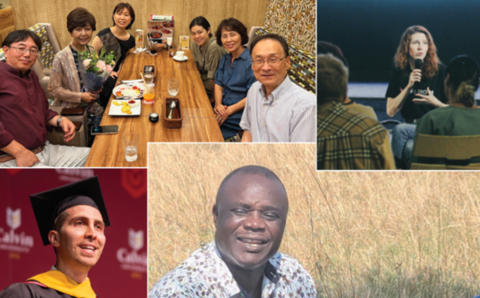In times of upheaval and uncertainty, there is a strong temptation to hunker down and look after your own. In churches this can happen when there is a difficult separation with a pastor or a painful division that results in members departing a congregation.
While a certain amount of introspection is necessary to address unhealthy dynamics in a family or congregation, consider the behavior of the early church. Its founder and Messiah had been betrayed and murdered. Its adherents were being persecuted and martyred. These included prophets, disciples, and apostles such as John the Baptist, Stephen, James (the son of Zebedee), and eventually Peter and Paul. The church was bitterly divided over the ongoing observance of the Old Testament law. There were all manner of moral scandals, public and private. If anyone had the right to hunker down and look after their own, it was the early church. But it took the opposite approach.
The apostle Paul writes in Romans 15:19-20: “So from Jerusalem all the way around to Illyricum, I have fully proclaimed the gospel of Christ. It has always been my ambition to preach the gospel where Christ was not known, so that I would not be building on someone else’s foundation.” The early church sent missionaries such as Paul, Barnabas, Timothy, Silas, John Mark, Luke, and others from Jerusalem to Illyricum (the modern-day Balkan countries), Rome, and as far as Spain and Persia to gather in believers from every race, tribe, and language. What could motivate a small, struggling, persecuted, and scattered band of believers “to preach the gospel where Christ was not known?”
On Pentecost, the disciples were holed up in a room together, waiting for the visitation of Jesus’ promised “power from on high.” After Pentecost, the Holy Spirit launched them into the big, wide, scary world. In fact, it was in Antioch, hundreds of miles away from Jerusalem, where believers were first called Christians.
What does this mean for our Christian Reformed congregations 2,000 years later? Much like that early church, CRC congregations are experiencing upheaval and uncertainty. I would argue that today God is calling us from a posture of hunkering down to one of looking around.
First, God is calling us to look around and embrace his global vision for the church. Nearly a quarter of CRC congregations are made up primarily of non-white believers, many of them immigrants. Many more predominantly white congregations are blessed to be increasingly diverse. Many of our immigrant brothers and sisters are still connected to friends, family, and congregations around the world. These global relationships provide opportunities for mutual learning, growth, church planting, and mission, in North America and beyond.
The CRCNA’s synod has established a Global Vision Implementation Team to study and recommend ways for congregations, classes, and our denomination to deepen their connections to the global church. I have been blessed to be part of this work.
I would be remiss if I didn’t note that in North America, especially in the United States, immigration policy and enforcement has become increasingly harsh and hurtful. In contrast, the CRCNA has always advocated for a posture of love and welcome toward immigrants, migrants, and refugees in alignment with Scripture and our confessions (See crcna.org/welcome/beliefs/position-statements/immigration-and-refugees).
Second, God is calling us to look around and embrace God’s call to gospel mission. Scripture and our confessions teach that God eternally chose believers for the free gift of salvation (Eph. 1). But we have been saved by grace to be ambassadors of Christ’s mercy to this broken and hurting world. Jesus’ mission includes the proclamation of the gospel, but also concrete acts of mercy and kindness. How much energy in our congregations goes to these kinds of good works that God has “prepared in advance for us to do” (Eph. 2:10)?
Finally, we can look around and embrace the blessing of our shared CRCNA ministries, agencies, and institutions. In this segment of The Banner, you can read stories about how these ministries are mobilizing and supporting local Christian Reformed congregations in their missional calling. These stories are inspiring, and they speak powerfully to the obedience of generations of CRC members to the gospel call that led the early church to send out apostles to the end of the earth. To expand the reach of our shared mission, these ministries need the support of CRC congregations and members. Will you join in these wonderful ministries by giving, praying, and volunteering? This is one concrete way CRC folks can look around and see what God is doing in God’s big world.
As we consider ways in which we can embrace God’s outward vision for our congregations’ ministries, may we remember that the same Spirit that launched the early church “from Jerusalem all the way around to Illyricum” empowers us today.
About the Author
Rev. Zachary King is the general secretary of the CRCNA. He is a member of Cascade Fellowship Christian Reformed Church in Grand Rapids, Mich.









